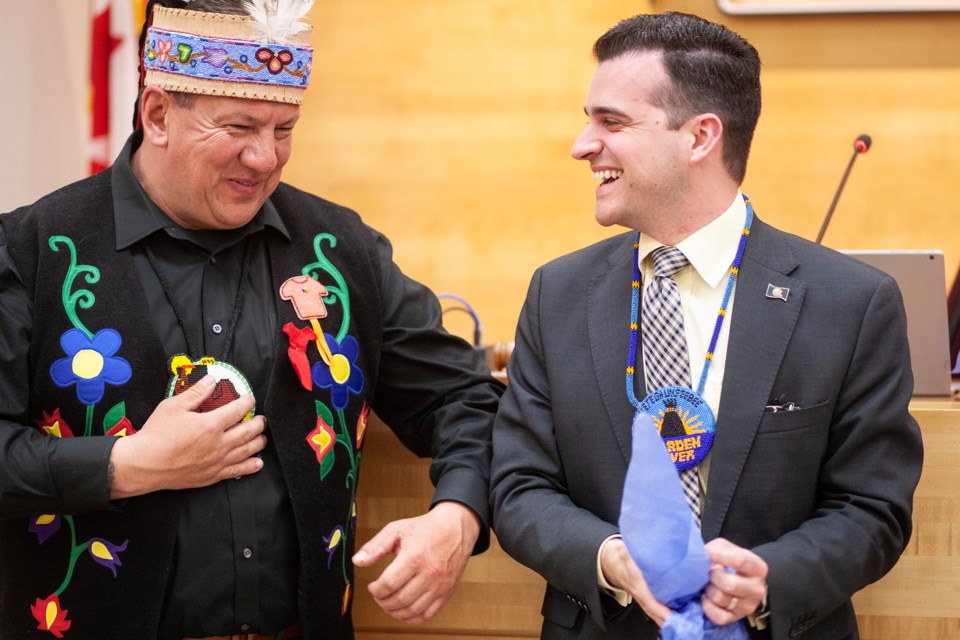The historic $10-billion settlement struck between Canada, Ontario and 21 First Nations in the Robinson Huron Treaty territory addresses historic injustices and is expected to boost economies of communities including Sault Ste. Marie.
But the chiefs of Garden River and Batchewana First Nations came to Sault Ste. Marie city council tonight, cautioning local leaders that the new treaty wealth also poses risks to vulnerable individuals.
"As you know our First Nation will soon be receiving funds from the Robinson Huron treaty settlement. This is the largest First Nation settlement in the history of Canada," said Chief Mark McCoy from Batchewana First Nation.
"These funds are for past annuities and generations of our ancestors who didn't receive the expected annual payments they were promised by the Crown in 1850 in exchange for access to our lands and resources.
"Batchewana is anticipating that money will flow to our First Nation this summer.... Our populations will be stimulating the local economy, which will be of great benefit for our neighbours in Sault Ste. Marie.
"We are cognizant that this money may have detrimental effects to some of our vulnerable members as well. We are preparing for this by setting up as many information and support sessions as we can to help with the people in need," Chief McCoy said.
"With Sault Ste. Marie benefiting from the wealth that will be brought to the city, we do expect the city to help provide the necessary care for the vulnerable ones that are in the city."
"We hope to see the city invest with support resources for urban members who may require assistance."
"I believe we will need to continue to monitor the needs and the climate of our respective communities as the settlement reaches our doorsteps," said the Batchewana chief.
Garden River First Nation Chief Karen Bell said the timeframe for the first instalment of treaty fund distribution is to be released at the end of July or early August.
"As you're all aware, the First Nations are set to receive an extremely large amount of money as a result of Robinson Huron Treaty settlement," Chief Bell said.
"Garden River's plans include a mix of payments to its members and the establishment of a legacy trust, including a minor's trust."
The band is setting up education sessions covering topics including financial literacy, wills and estates, elder abuse, cyber crimes, mental health and addictions.
"We are also having online engagement sessions for members who live outside the Algoma District. It should be noted... that 70 to 75 per cent of our members move away from the nation. In total we have approximately 3,500 members.
"The collaboration and partnership with the City of Sault Ste. Marie is very important, and with the leaders is the key to navigating this very uncharted historic event."
"Garden River First Nation is requesting service providers in the City of Sault Ste. Marie be cognizant that a hard, long influx of its members at a higher rate than normal will have extensive wealth.
"Though they have the right to utilize the monies as they see fit, leadership hopes that any anomalies will be brought to our attention," the Garden River chief said.
"There are some people that never had any money, live very substandard. And they're going to come to the City of Sault Ste. Marie because for Garden River and Batchewana, this is the closest municipality where they're going to spend some money."
"I'm asking you full-heartedly and with passion, don't hurt our people. Treat them with dignity and respect."
Chief Bell called on leaders in the city to look at Call to Action #57 made by the Truth and Reconciliation Commission in June 2015:
We call upon federal, provincial, territorial, and municipal governments to provide education to public servants on the history of Aboriginal peoples, including the history and legacy of residential schools, the United Nations Declaration on the Rights of Indigenous Peoples, treaties and Aboriginal rights, Indigenous law, and Aboriginal–Crown relations. This will require skills-based training in intercultural competency, conflict resolution, human rights, and anti-racism.
"Specifically," Chief Bell said, "to understand and acknowledge the impact of colonization and intergenerational trauma."
"Garden River is making an official request to the City of Sault Ste. Marie to start acknowledging the traditional territory of Indigenous people at each and every Soo Greyhound home game."
"If you need help with the wording, I'm more than willing to provide some assistance in that for the acknowledgement at every home game of the Greyhounds," she said.
Ward 5 Coun. Corey Gardi said any community anywhere in Canada would experience problems if its citizens experienced a sudden deluge of cash comparable to the treaty settlement.
"I'm glad that our community is going to be working with our neighbouring communities to meet those challenges," Gardi said.
"I'm very hopeful and request that our business community and those who may be providing services to our indigenous neighbours do that with the utmost sensitivity and compassion."
Mayor Matthew Shoemaker saw some positives in the treaty settlement.
"We've heard a lot about the risk that's going to be present with the distribution of funds, but it is a celebration," Shoemaker said.
"We're talking 150 years where the Government of Canada didn't live up to its obligations under the treaty. So it's a great thing to see that a breach of contract – as it is in the simplest terms – is being rectified even after all these years.
"It's a positive for your community that throughout all the difficulty in the fraught relationship over the years with the Crown, there is a better path forward. And hopefully this will be the beginning of a better path forward," the mayor said.
